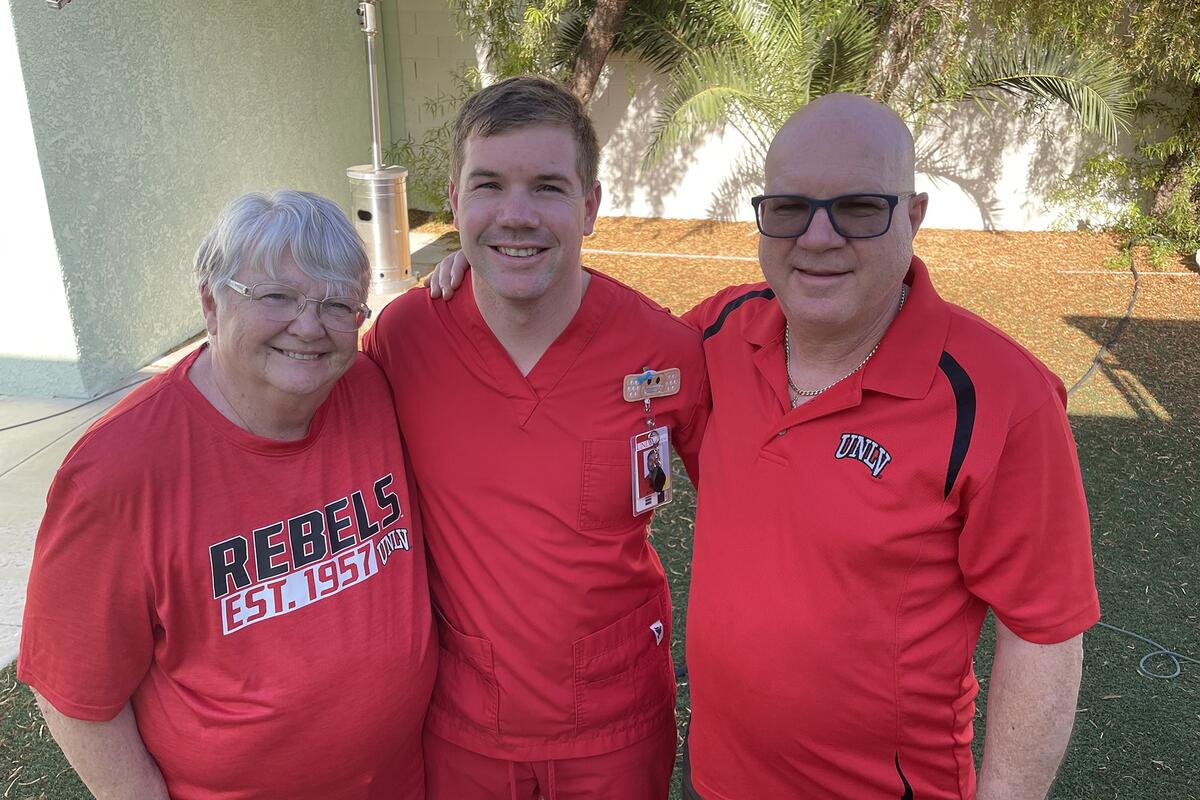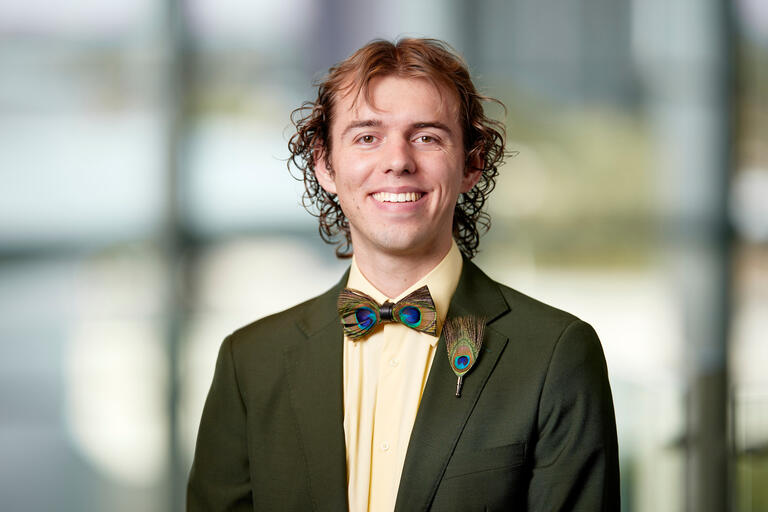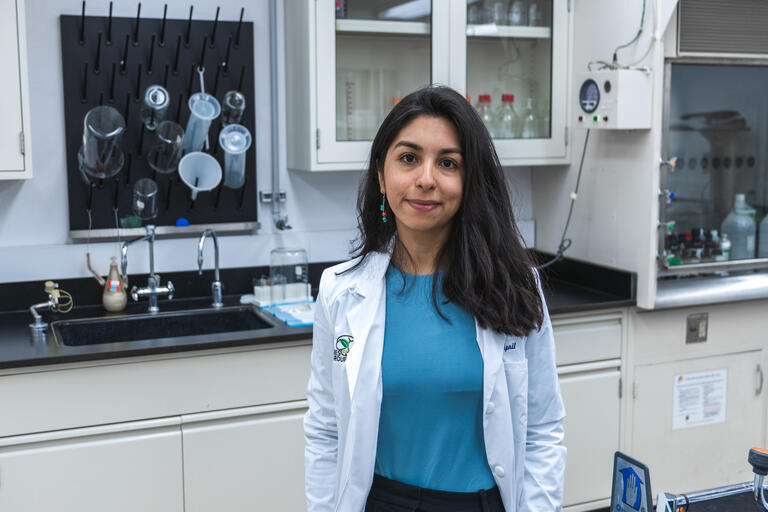When Dilon Petersen graduates from the UNLV School of Nursing on Aug. 25, he’ll become the third member in his family to do so. Dilon’s father and grandmother are both UNLV alumni. Here the family looks back on how their affinity for nursing has persisted from one generation to the next.
Sherry Therrien - MSN, RN, ’76, ’87, ’93
Sherry Therrien knew as a child she wanted to be a nurse. She earned her associate’s degree in nursing from UNLV in 1976, surprising even herself. “I never graduated from high school,” she says. “So there was literally no way I could ever go to college or become a nurse. But they came out with [the GED] in the late ’60s. So, I took the GED in 1970, and I scored high on it.”
Her nursing dean at the time, Mary Ann Kedzuf (Michel), inspired her journey toward an advanced degree, based on a story about her working as a floor nurse. “Someone asked her, ‘[If] you have a doctorate, why would you want to work as a nurse?’ Her answer was, ‘If I can give the very best care at the highest level, why wouldn't I?’ That made me stop and think.”
Therrien added that with the pressures of supporting a large family, she knew she had to keep working. She eventually earned her bachelor’s in 1987 and her master’s in 1993. She fondly remembers spending time with her children as a nursing student. “All of my kids, we would sit and do our homework together at the table,” Therrien says. “They were my guinea pigs. They helped me study.”
Therrien spent her career working at Desert Springs and Sunrise hospitals. She helped start a pain program in Western Nebraska and also taught at the University of Nebraska extension in Omaha. Based on Therrien’s time in nursing, she stresses to young nurses like her grandson, Dilon, to prioritize time at the bedside with patients to get to know them. “Four years ago, I had surgery. I had a wonderful experience, but I felt like, [to] my nurse, the computer was more important to her than me,” she explains. “It was like she talked with her back to me, charting into the computer. I missed that eye and face contact.”
Therriern hopes her grandson will go for his advanced degree like she did. But no matter what, she’s happy the nursing lineage continues. “I am so proud we have carried this on,” she says. “My grandfather's sister was a nurse during the First World War. I have a cousin who was also a nurse. But to think maybe some little way I influenced these guys to go into nursing and to know they're caring the way they are, it's very special to me.”
Robert Petersen - BSN, RN, ’08
Therrien’s son Robert Petersen didn’t jump into nursing automatically. He tried his hand working for his uncle, but after a year, he wanted something more. Dorothy suggested trying out for her hospital’s new respiratory therapist program, so he at least had a job right out of school. He earned the job on his 19th birthday, and worked in respiratory therapy for 25 years.
But after that, his hospital required all therapists to have a college degree (due to new state laws on licensure) and Therrien suggested nursing. “Even though he was certified in several blood gasses and those kinds of things, he wasn't registered because he didn’t have the schooling,” she recalled. “He saw the writing on the wall.”
It wasn’t an easy decision, largely because of then-societal norms. “It wasn't cool for boys to be nurses in that era; it was a different era,” he says. “Then probably in the mid-eighties, it became more acceptable. I knew some other guys who were becoming nurses. It was a paradigm change, more and more people.”
Additionally, he lauded his mom for inspiring him. “I saw what she did with her career and how rewarding it was,” Robert remembers. “She'd come home and we'd talk. Having been working in the hospital closely with nurses, you'd have to go back and talk with the nurses to get the rest of the story on what happened [with patients]. I wanted to be more involved with patient care.”
After taking courses at CSN, he eventually transferred to UNLV as a non-traditional student, graduating at age 48 in 2008 with his bachelor’s in nursing. Having already lived a life in healthcare, Robert was ready for nursing school.
“I think it let me know what I was getting into,” he says. “I wasn't timid or afraid. Whenever we're [were] doing clinicals, I wanted to be the first one to do whatever, get in there and ‘I want to do that and I want to try that.' Doing respiratory, I'd done tens of thousands of blood tests, ABG draws; it didn't affect me to poke somebody for blood or stuff like that.”
And many of those in his cohort looked up to him for that experience. “The [students] I went to school with – I had kids almost their age,” he says. “I was like ‘The Pops.’ Some of them leaned on me for that because it didn't bother me.”
Throughout the whole transition to nursing, Robert sought his mother’s help when necessary. “We talked about things that I didn't understand, [like] medications, because that was probably the toughest part,” he says. “[When] I was working in oncology. I would talk to her because she had a long career in that.”
She delivered consistent nuggets of wisdom throughout his training. “Just work hard. Your studying pays off; pay attention and keep at it,” Robert recalls. “It's gonna pay off in the future, learn what they're giving you, take that and go with it.”
It’s that same insight Robert now passes on to his son Dilon. “We talk about what he's doing,” he explains. “He'll ask me certain things. I just give him food for thought on different stuff. He'll ask how things sound or like a medication question so I can help him out with that. If I don't know that, we can always look it up.”
Since graduating, Robert followed in his mother’s footsteps another way, working at Sunrise Hospital’s oncology unit before transitioning to the recovery room/post-anesthesia care. He’s appreciative of the path he chose, not only building a career like his mother, but providing support for patients, saying, “I think it's an honor to serve the community and do something.”
Dilon Petersen - Graduating August 2022
Dilon Petersen’s health career seemed to be laid out in front of him. His family inspired his interest in nursing, and like them, he took an unconventional route to get there. Prior to nursing school, Dilon worked casino security for six years, splitting his time between the Wynn and Sunset Station. He also spent eight years in the Marines as a reserve. Dilon began nursing school in spring 2021 during the pandemic, which only empowered him. “It was inspiring seeing how I could actually get out and help,” he says. It made me wish I did this sooner, just so I could be in the hospitals, helping those patients and those families recover.”
Like his dad, Dilon enrolled as an older student (29 years old), and similar to Robert, that previous life experience was an asset. “The time management was a huge one that helped,” he says. “I led a squad of Marines, which gave me insight on how to be a good leader and help my fellow classmates.”
And like his dad, classmates would seek out his help during clinicals. “Other students will ask me to ask questions or go up to somebody because they're scared or nervous to talk to another nurse.” But Dilon says he tried to turn that attention back to faculty. “I feel some of my life experience has given me insight that they're here to teach us, and they're here for our learning,” Dilon says. “[You should] not be scared to go up and talk to them.”
Dilon credits his father and grandmother for clarifying certain concepts. “They helped with my care plans, formulating nursing interventions and rationales between abnormal lab values,” he says. “If I couldn't quite figure it out or put it, they would break it down and explain it to me. I feel that helped me understand why. The next time I saw it, I had a better understanding of what was going on with the patient.”
After graduating, Dilon plans to stay in Southern Nevada working in the ICU before eventually trying out travel nursing. “I've traveled to a few places, but I haven't seen a lot outside, so it'd be nice to be able to travel and see different states,” he says.
Representing the next generation of nurses in the Peterson household gives Dilon a strong sense of pride. “It's a lot of work to get through nursing school and just the fact that I'm able to follow in my family's footsteps and uphold that tradition, it feels good,” he says. “It wasn't something I knew if I was gonna do, I'd say four, five years ago. I didn't think I was gonna be going down this path. I'm lucky I have a supporting family that could help me through nursing school, and I'm thankful for them.”



